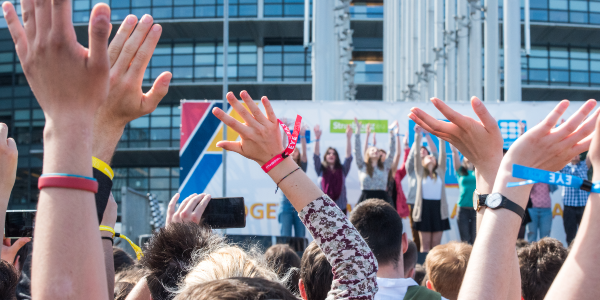Youth political engagement in the EU: The age of a democracy accounts for variations in levels of youth participation
While socio-demographic characteristics (at individual level) matter for levels of political participation, country-level characteristics have an effect as well. Magdelina Kitanova shows that the democratic maturity of a country influences patterns of political participation among young people in the EU. Youth political engagement varies significantly, and young individuals living in established democracies are more likely to be politically active.

European Parliament Youth Event 2016. Picture: European Parliament / (CC BY-NC-ND 2.0) licence
Political participation is a vital cornerstone of a healthy and well-functioning democracy. Young people’s (dis)engagement has been a focus of interest not only to policy-makers but academics as well. However, much uncertainty still exists about the macro-level determinants of youth political participation. I address this issue in my recent paper and suggest that age of democracy shapes variations in levels of youth political participation in the EU. I outline an empirical analysis of 28 EU countries exploring the effect of micro- and macro-level factors on the propensity of young individuals to participate in politics using the Eurobarometer survey dataset (No. 375 2013).
Declining levels of youth political participation pose a challenge to many advanced and new democracies. Young people seem to have lower levels of political engagement when it comes to participating in traditional political activities such as voting and being members of political parties than older people. Young people are regarded as one of the most disengaged groups in politics. Therefore, studying what influences youth political (dis)engagement matters.
Political participation can take many forms. I define it as any lawful activity undertaken by citizens that aims at influencing, changing or affecting the government, public policies, or how institutions are run. To be more specific, I analyse voting and being a member of a political party as ‘formal political participation’; I also look at whether individuals are members of organisations such as community, youth or cultural organisations, and any other non-governmental bodies.
Most research on youth political participation has focused on the individual-level characteristics as main determinants of youth political engagement. However, as Figure 1 shows there are variations in levels of political engagement across EU countries. The figure presents average levels of engagement in formal political participation as well as organisational membership.
Figure 1: Levels of formal political participation of young people in the EU28 countries

Eurobarometer 375 2013. Note: For regression analyses of each mode of political participation, see the authors’ accompanying article in the Journal of Youth Studies
I hypothesise that democratic maturity presents the individuals with conditions that shape their choice to participate or not participate in politics, and how to participate. I suggest that the age of a country’s democracy has a direct impact on the propensity of young individuals to engage in politics. The differing historical context of newly established post-communist countries and advanced democracies has a potential influence on the political behaviour of individuals in these countries. To test this hypothesis, I used the Eurobarometer 375 survey data from 28 European Union countries consisting of 11,213 respondents after data clearing.
Not only individual-level characteristics! Context matters too
My analysis reveals that while individual-level characteristics matter, democratic maturity accounts for patterns of political participation among young people in the EU. In terms of individual-level characteristics, I find that age is significantly associated with higher levels of participation in traditional political activities. Individuals aged 25 to 30 are more likely to engage in formal politics than their younger counterparts, whereas younger individuals are more likely to be members of other types of organisations. There is an inverse relationship between age and organisational membership, which indicates that as a respondent gets older, the odds of them being a member of organisations decreases. In addition, education and social class have a positive and significant effect on the propensity of young individuals to participate in politics.
What is the effect of country-level characteristics? The results from the final analyses showed that age of democracy is a crucial predictor of youth participation across EU countries. Political engagement among young people varies depending on the age of the democracy they live in. Young people are more politically engaged in established democracies. In addition, young people in advanced democracies are more likely to be members of organisations than young individuals in new democracies.
Figure 2: Average levels of political engagement in formal participation and organisational membership

Eurobarometer 375 2013
Figure 2 illustrates that levels of youth political participation differ significantly across countries, which could be explained by the unique experiences of these countries. It is clear that there is a general pattern that advanced democracies have higher levels of youth political participation in formal politics as well as in organisational membership. If we consider the political history of post-communist countries, these tendencies are not surprising. Post-communist countries experienced nation-building and industrialisation in later years, and the establishment of civil society was delayed.
Beyond these results, we need to understand what determines young people’s engagement in politics better. My paper contributes to youth engagement literature by conducting empirical research investigating determinants of young people’s political participation by conceptualising age of democracy. When it comes to contextual predictors of youth political participation, there are existing differences between countries, especially between new and old democracies.
Political participation among young people is not universal in any democracy but varies with the age of democracy. Future research on determinants of youth political participation should consider the influence of contextual factors as they have a crucial role in determining levels of participation.
This article gives the views of the author, and not the position Democratic Audit. For more information, see the authors’ accompanying article in the Journal of Youth Studies, ‘Youth political participation in the EU: evidence from a cross-national analysis‘.
About the author

Magdelina Kitanova is an ESRC funded PhD candidate in Politics at the University of Southampton. Her research focuses on institutions as determinants of youth political participation.





 Democratic Audit's core funding is provided by the Joseph Rowntree Charitable Trust. Additional funding is provided by the London School of Economics.
Democratic Audit's core funding is provided by the Joseph Rowntree Charitable Trust. Additional funding is provided by the London School of Economics.